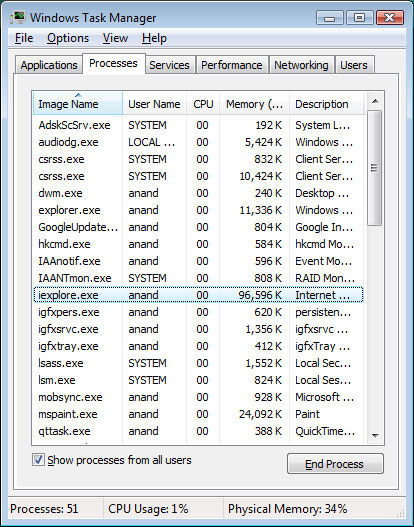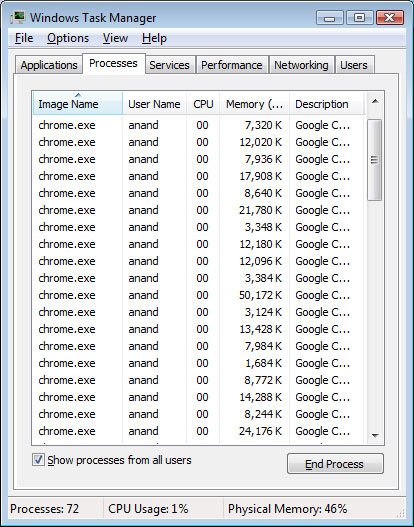Google Chrome: Performance and First Impressions
by Anand Lal Shimpi on September 3, 2008 12:00 AM EST- Posted in
- Software
More Efficient Memory Management
Fire up an IE7 window with 10 tabs in it and you’ll see this in your Task Manager:

A single iexplore.exe process that spawns a number of threads. The same goes for Firefox and Safari. The problem here is that if a single tab causes the process to crash, all of your open websites go with it. Chrome treats each tab as an individual process, which adds a little more overhead but the benefit is a single website won’t cause all of your other browser tabs/windows to crash.

You shouldn't lose all Chrome windows/tabs due to one misbehaving website/app
A single webpage stalling also won’t cause the rest of the tabs to stall, while the tabs in a Chrome window look physically connected, they are as independent as they get.
Chrome, as a result, will take up quite a bit of space in Task Manager:

Making each tab its own process means that you get memory back from closed tabs much quicker and much more efficiently than with other browsers. Consider this test: 1) Visit www.anandtech.com, 2) open tabs for digg.com, docs.google.com (and login) and www.facebook.com (and login), 3) Close the latter three websites.
I performed that exist test, in that order, and measured memory size after each step. The results are below:
| Websites | Google Chrome 0.2.149.27 | Internet Explorer 7.0.6001.18000 | Firefox 3.0.1 | Safari 3.1.2 |
| Just AnandTech.com | 26MB | 30MB | 30MB | 48MB |
| AT + Digg + Google Docs + Facebook | 105MB | 97MB | 87MB | 104MB |
| AT (After closing 3 tabs) | 38MB | 78MB | 70MB | 107MB |
Just viewing AnandTech alone, Chrome ended up being the most efficient browser with a 26MB footprint compared to 30MB for Firefox 3.0.1, 30.1MB for IE7 and a whopping 48MB for Safari 3.1.2.
Adding the other three sites brings the totals up to 104MB for Chrome, 104MB for Safari, 96MB for IE7 and 87MB for FF.
It’s closing the tabs that’s the most interesting: only Chrome actually frees up memory upon closing tabs. Chrome’s footprint is still larger than its original 26MB at 38MB, but the remaining three browsers continue using at least 70MB. The argument here is that these other browsers already have memory allocated should you open additional tabs, unfortunately you can quickly run into memory fragmentation issues with the conventional approach should the new tabs require more memory than the ones you just closed.
With Chrome, each tab is its own process, when you’re done with a tab - close it and you get all your memory back right away. You get more efficient usage of memory for newly created tabs.
The independent tabs are also physically independent within the UI, you can drag any tab out of a window and into another one or make it a new window by itself.
Chrome’s multi-process approach is also theoretically better for multi-core systems since you don’t have to worry about exploiting parallelism within a process, you’ve got process-level parallelism giving you more than enough threads to distribute across many cores. Thankfully web browsing isn’t the most CPU intensive and this process-level parallelism doesn’t amount to a huge performance benefit.










105 Comments
View All Comments
Griswold - Thursday, September 4, 2008 - link
I dont think it was too much to ask for to mention that the tiled favs on an empty tab is an idea from norway (opera, in case you really didnt know).I think thats important, because its one of the best add-ons i'm using with firefox - oops, another browser that had it before chrome. :P
Babbles - Thursday, September 4, 2008 - link
I am a big fan of Opera, but even when putting aside any sense of fanboy-ism, Google Chrome seems to be nothing but an unoriginal lackluster version of what Opera has been offering for years. Firefox is always behind Opera's innovation and Google is even trailing behind that, yet Anand, and many reviewers out there, seem to essentially ignore Opera's browser innovation.I get the feeling that if anybody other than Google released this, then people would probably just laugh it off.
daar - Thursday, September 4, 2008 - link
I'm running a firewall on my comp, and even when Chrome is not open, it seems to try to connect to google every 20 minutes or so...why is this?Is there anyway to start by default in incognito mode?
Griswold - Thursday, September 4, 2008 - link
fire up msconfig and look for googleupdate.exe. Thats what is phoning home.Anubis - Thursday, September 4, 2008 - link
1) it likes to phone home2) no idea
3) still pissed about the Opera issue
mikefarinha - Thursday, September 4, 2008 - link
I just wanted to make some points that weren't mentioned in the comments so far.1. In the article it was mentioned that the look of Chrome is OS agnostic, I have to disagree. Chrome is very much in line with how a true Vista app should look. It makes fantastic use of the Aero interface, much more so than IE7 or IE8.
2. I think the ability to drag tabs into their own window is a fantastic idea and something I've been wanting for a while. It will come in quite handy when you have video running and want to do some reading on another website. This feature is bigger than any of the reviewers I've read have given it credit for. Many people actually seem to dismiss it as simply a glitzy feature, they're very wrong. I'd bet IE 8 will have this feature by the time it goes final.
3. It is also great that Chrome puts all it's tabs into different processes, however it wasn't mentioned that IE8 Beta 2 does this also, which was released about a week before chrome.
4. I think Chrome is going to become Google's platform, look for Google to, sooner or later, start basing a lot of their applications exclusivly around Chrome.
5. IE8 Beta 2. Where is the comparison? I've been using Firefox exclusivly since around 2005, just before it reached version 1.5. Firefox is great and has trumped Opera and IE in versatility. However I've been using IE8 Beta 2 for the past week (Beta 1 was crazy buggy!) and have been througly impressed. I think it is time for Anandtech to do a browser shootout article to give a base line on the current state of web browsers, it is really an exciting time for this technology!
BaronMatrix - Thursday, September 4, 2008 - link
Great browser. It solved my problem with FF3 that would stop streaming video after awhile. I never use the menu or the Options so who cares. It seems to do better with ad-filled sites (like this one) and I have yet to see a page that doesn't render properly - at least after a refresh.My company Portal never rendered right in either IE or FF, but now it does. I dig the Download bar. I really like the Task Manager. It does worry me that when you search from the OmniBar, it appends "Chrome" to to the query.
It did error when I tried to login here, but only in that it didn't return to the Login box. I'm also noticing some strange text things while I type this. Sometimes the text will disappear or I have to hit the INSERT button.
All in all it's a better experience than the others. I really like the Home Page since I don't have to look for the sites I go to on the Bookmark Bar.
humbi83 - Thursday, September 4, 2008 - link
The zoom feature is disappointing. The images don't get scaled and the page gets distorted. This is a show stopper for me as on 1900x1200 on 17" the zoom feature is a must on a lot of web sites.dickeywang - Thursday, September 4, 2008 - link
I just hope that they can provide a Linux version that can render the web pages as fast as those browsers in Windows.jvaudio - Thursday, September 4, 2008 - link
I absolutely hate how tech sites give Google a free pass on their behaviors.Taken from Joe Wilcox:
I've just got to excerpt from this document: "When you type URLs or queries in the address bar, the letters you type are sent to Google so the Suggest feature can automatically recommend terms or URLs you may be looking for."
Can you say keylogger? What else could "the letters you type" mean?
Now make sure you read this paragraph at least twice:
"Your copy of Google Chrome includes one or more unique application numbers. These numbers and information about your installation of the browser (e.g., version number, language) will be sent to Google when you first install and use it and when Google Chrome automatically checks for updates. If you choose to send usage statistics and crash reports to Google, the browser will send us this information along with a unique application number as well."
WTH? Application numbers? Well, well, browsing is a whole lot less anonymous with Chrome. Why is there no uproar? Microsoft got hammered by the news media in 2001 because Windows XP appeared to send user identifiable activation numbers during setup. Google is identifying your browser with a unique number. What would prevent that number from being associated with a Google ID for Gmail or related service?
This is a good read on the details of how Google is the Ultimate Big Brother:
http://www.microsoft-watch.com/content/web_service...">http://www.microsoft-watch.com/content/...r/chrome...
With that said, I do use it, but as my third browser. I use IE8 and Opera as my main browsers. I use IE for checking email, banking, grad school, and light surfing. I use Opera for everything else. It is a fantastic browser. I was very excited about Firefox 3 because I haven't used it in years (because it sucked hard after 1.5). It works EXTREMELY poorly on Vista 64 bit. I have completely abandoned its use and it has been replaced by Chrome. If Google can show that it can clean up security issues in a timely manner, I intend to use it on occasion and leave it on my system.